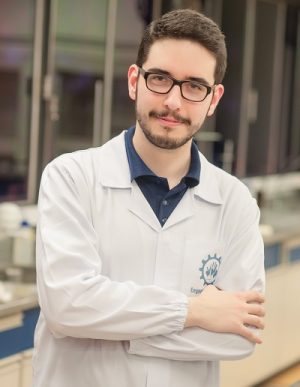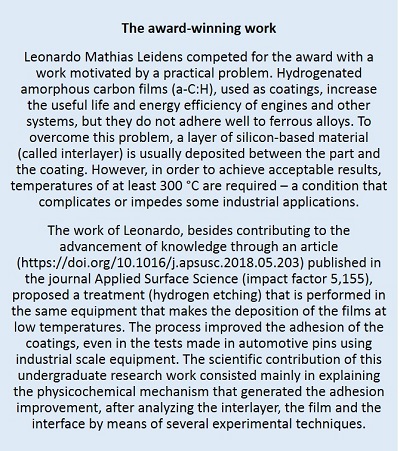
When he answered the telephone on that May afternoon, Leonardo Mathias Leidens, 24 years old, thought it was a hoax. The president of CNPq (the Brazilian federal organization dedicated to the promotion of science and technology) was giving him the news that his undergraduate research (iniciação científica in Portuguese) had been chosen as the best in Brazil in the area of Exact, Earth and Engineering Sciences, in the sixteenth edition of the Prêmio Destaque na Iniciação Científica e Tecnológica.
However, in hindsight, if Leonardo had contained his excitement and looked back at that moment, he would have realized that the prize was in fact a likely consequence of a steady path through scientific knowledge, and a well-deserved recognition of his competency and dedication.
Leonardo was born in 1995 in Caxias do Sul, municipality of the Brazilian State of Rio Grande do Sul, of about 500 thousand inhabitants and an important industrial pole. After attending a public school in the city, always with excellent school performance, in 2013 Leonardo joined the undergraduate course in Chemical Engineering of the University of Caxias do Sul (UCS), a community university headquartered in Caxias do Sul, which has its campi in eight municipalities of the region.
In the first half of 2014, Leonardo found an opportunity to start doing science. He became a scientific initiation fellow, under the guidance of Professor Carlos A. Figueroa, leader in the UCS of a group of fundamental and applied research in Surface Science and Engineering, which would later receive the name of “Epipolé Group.” In this group, and always with the same advisor, Leonardo worked in several studies concerning the adhesion of amorphous carbon films as a scholarship holder of the university and then of the CNPq programs for undergraduate research. As a result of this work, Leonardo has today nine scientific papers (one of them as first author) published in international peer-reviewed journals, including some of the best journals in the area of surfaces and thin film.
In August 2016, Leonardo left the country for the first time to attend two semesters at the École Supérieure des Industries Chimiques (ENSIC), in the city of Nancy (France), after being selected as a fellow of BRAFITEC, a Brazilian federal program that supports the mobility of engineering students between institutions in Brazil and France. In this period, in addition to attend the courses, Leonardo presented, for the first time, a work in an international scientific event, the E-MRS 2017 Spring Meeting, held in the French city of Strasbourg.
After this enriching experience abroad, in mid-2017, Leonardo returned to Caxias do Sul and resumed his academic activities at UCS, including the undergraduate research in the Epipolé Group. In December 2018, he completed his bachelor’s degree in Chemical Engineering with a 3.96 average out of a maximum of 4 in all of the subjects studied. As a result, on graduation day, Leonardo was awarded the Academic Laurel by the Rector of UCS.
Due to his experience in more than four years as an undergraduate research fellow, Leonardo decided to pursue a doctorate without undertaking masters studies (Masters degree is the usual step before PhD in Brazil). Thus, earlier this year, he became a doctoral candidate of the Postgraduate Program in Materials Engineering and Science (PGMAT) of UCS, again under the guidance of Professor Figueroa.
On July 23, Leonardo will receive his CNPq award at the ceremony to be held in the city of Campo Grande (State of Mato Grosso do Sul) during the 71st Annual Meeting of the Brazilian Society for the Progress of Science (SBPC).
See our interview with Leonardo.
 B-MRS Bulletin: Could you tell us briefly how and when you started and developed your interest in science/research? And your desire to become a scientist?
B-MRS Bulletin: Could you tell us briefly how and when you started and developed your interest in science/research? And your desire to become a scientist?
Leonardo Mathias Leidens: Curiosity has always been a perceivable characteristic of my personality. The will and concern to know the origin of “everything”, the whys and how things work led me to science, even if in a somewhat unconscious way. My parents always encouraged me to read and this was essential in the search for answers to my questions and in the development of creativity. More than that, as a child, I loved to work on simple experiments I learned on TV shows (unfortunately, the internet was not widely available in the 90s) or to create my own awkward experiments when I got a children’s chemistry kit (but with the simple instructions I would soon lose interest). Curiously, it took me quite a while to realize that combining all these things I did naturally and enjoyably could shape my career. It took a few years until, in high school, the penny dropped, and from there on I set out to achieve a new goal: to become a scientist. I entered the Chemical Engineering course with the intention of participating in Undergraduate Research activities and follow the academic career.
B-MRS Bulletin: Very briefly, what were the main competencies you have developed over the years as an undergraduate research fellow?
Leonardo Mathias Leidens: Basically, the greatest personal and professional development was the training in the “scientific method,” that is, the initial competency for training a scientist. Asking questions, seeking the state of the art and the answers already available for comparison with the presented reality and questioning/comparing the results became daily activities. In order to be able to develop all these research steps, training in complex equipment, data analysis and the proposal of ideas and projects were skills that I had to developed. In addition, throughout my scholarship I was able to improve languages, such as English (the language of science), as well as writing papers more meticulously and aptly for international journals, congresses, reports and projects.
B-MRS Bulletin: In your view, what were the most important factors that contributed to the achievement of the award-winning work?
Leonardo Mathias Leidens: Initially, it was the group’s trajectory, structure and experience in different approaches to minimize the adhesion problem of amorphous carbon films in ferrous alloys that allowed the work proposal and the result achieved, because with broad knowledge of the material system studied, it was possible to investigate in a meaningful way the problem and the positive modifications generated with the use of the hydrogen plasma. In my view, the success was the integration of basic science (the study of physicochemical mechanism of the treatment) with a real problem (to deposit the coatings under milder and efficient conditions on previously problematic substrates), which made the work complete and interesting in the scientific (knowledge generation) and industrial (applications with energy efficiency appeal) scopes.
B-MRS Bulletin: In another interview, you talk about being a scientist as a lifestyle, not just a profession. Tell us about that lifestyle that attracts you.
Leonardo Mathias Leidens: That expression has, fundamentally, two justifications. First, and as I said earlier, the scientific method was one of the most important learning aspects I have experienced over the years. It is applied not only in research but in various activities. Questioning and verifying everything (by tests and comparisons) are a scientist’s requirement, both inside and outside the laboratory. For example, in a society where never-ending information (of different qualities) is available, rigor becomes necessary to compare, select, and verify just how true or secure the sources are. On the other hand, science as a way of life means living science broadly. Integrating a diverse community, participating in projects and partnerships, and being able to make a difference in any area (no matter how small it looks) is much more than a profession. Finally, being part of a group of people who, with different backgrounds, stories and goals, come together and work for the generation of knowledge and advancement of humanity, even with so many difficulties, attracts me, encourages me and is a source of pride.
B-MRS Bulletin: You are currently in the first year of your doctorate. Have you thought about any project or career path after your PhD?
Leonardo Mathias Leidens: My advisor always suggests planning the next five years (at least)… It’s not always easy, especially in very unstable times. Regarding the doctorate, I would like to participate in a sandwich period at a university abroad because, having lived through this experience during my undergraduate studies, I realize the greater importance it would have in my scientific training as a doctor. Later, I intend to follow in the academic career, as researcher, in some institution here in Brazil or abroad.
B-MRS Bulletin: We invite you to leave some tips for our readers who are carrying out scientific initiation work in the area of Materials, answering the question “How to develop a national outstanding work.”
Leonardo Mathias Leidens: It’s not easy to directly suggest ways to produce a distinguished work because, to a certain extent, this is a consequence of a job well done and not the result of a “formula.” However, to reach the goal, I can say that one must take an active role in the research, proposing, without fear or apprehension, well-founded ideas for a problem of the area, even if at the beginning it is difficult and challenging for a undergraduate student. As we produce our own questions, we are encouraged to seek the answers and if they are not available, offer ways to obtain them Thus, with lots of work, dedication and scientific discussion, it is possible to transform a project into an outstanding work that can contribute to the advancement of a specific area and, more extensively, of society. However, one thing is fundamental: do not get absolutely discouraged when things do not go as planned. When we are on the frontier of knowledge, the result is not always the expected result – but this cannot curb the advance for further attempts.
With regards to me, as an undergraduate researcher in the Epipolé Group, I have always had the opportunity to participate actively in projects and discussions (and not only follow graduate students or do “mechanical” work, although these activities are also part of any undergraduate research grant and are important), even as a student of the initial undergraduate periods, and I enjoyed all these moments. This was instrumental in understanding how science is made and integrate with the group. Although greater responsibilities are created in these interactions, they were instrumental in the growth, encouragement and formation of a basis that allowed me to propose my own ideas, after a period of study and practice. For this, reading many scientific articles was also fundamental, besides being always abreast of the innovations of the area, but not forgetting to pay due attention to the scientific foundations, that is, the fundamental concepts.
